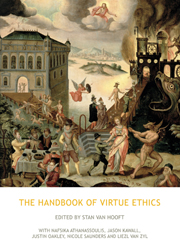Book contents
- Frontmatter
- Contents
- Acknowledgements
- 1 Introduction
- PART I NORMATIVE THEORY
- 2 Eudaimonia in contemporary virtue ethics
- 3 Stoic virtue ethics
- 4 Naturalistic virtue ethics and the new biology
- 5 Virtue ethics and moral sentimentalism
- 6 Virtue ethics and utilitarianism
- 7 Virtues and rules
- 8 Virtue ethics, virtue theory and moral theology
- 9 Nietzsche's virtue ethics
- 10 Right action and the targets of virtue
- 11 Qualified agent and agent-based virtue ethics and the problems of right action
- 12 The virtuous person and normativity
- 13 Virtue and identity
- PART II TYPES OF VIRTUES
- PART III APPLIED ETHICS
- PART IV THE PSYCHOLOGY OF VIRTUE
- Contributors
- References
- Index
7 - Virtues and rules
from PART I - NORMATIVE THEORY
- Frontmatter
- Contents
- Acknowledgements
- 1 Introduction
- PART I NORMATIVE THEORY
- 2 Eudaimonia in contemporary virtue ethics
- 3 Stoic virtue ethics
- 4 Naturalistic virtue ethics and the new biology
- 5 Virtue ethics and moral sentimentalism
- 6 Virtue ethics and utilitarianism
- 7 Virtues and rules
- 8 Virtue ethics, virtue theory and moral theology
- 9 Nietzsche's virtue ethics
- 10 Right action and the targets of virtue
- 11 Qualified agent and agent-based virtue ethics and the problems of right action
- 12 The virtuous person and normativity
- 13 Virtue and identity
- PART II TYPES OF VIRTUES
- PART III APPLIED ETHICS
- PART IV THE PSYCHOLOGY OF VIRTUE
- Contributors
- References
- Index
Summary
Righteous art thou, O LORD, and upright are thy judgements. Thy word is very pure: therefore thy servant loveth it.
(Psalms 119.137, 140)But this shall be the covenant that I will make with the house of Israel: after those days, saith the LORD, I will put my law in their inward parts, and write it in their hearts; and I will be their God, and they shall be my people.
(Jeremiah 31.33)The letter killeth, but the Spirit giveth life.
(2 Corinthians 3.6)Men will submit to any Rule, by which they may be exempted from the Tyranny of Caprice and Chance. They are glad to supply by external Authority their own Want of Constancy and Resolution, and court the Government of others, when long Experience has convinced them of their own Inability to govern themselves.
(Dr Johnson, in Boswell's Life, Volume 1)LEGALISM VERSUS ANTINOMIANISM, GENERALISM VERSUS PARTICULARISM
For virtue ethicists and their allies to inveigh against “algorithmic” or “mechanical” rule-based procedures in ethics is one of the best-known rhetorical tropes in contemporary philosophy. Anyone whose ethics depends on moral rules must (so the trope goes) be some sort of primitive: an insensitive and inhumane legalist, a humourless rule-fetishist, a grim robotic puritan, a self-righteous Pharisee. Sophisticated ethicists will have little or no place in their moral thinking for rules; virtue ethics especially, being an “agent-centred” rather than an “act-centred” ethics, will say that the virtuous agent does the right thing effortlessly, without the slightest even-mental recourse to the Look-It-Up Book of Doing Right.
- Type
- Chapter
- Information
- The Handbook of Virtue Ethics , pp. 76 - 87Publisher: Acumen PublishingPrint publication year: 2013

